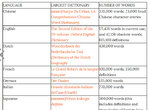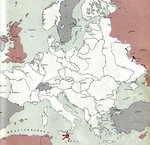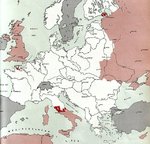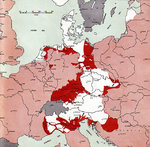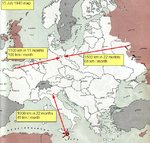Yamato
Legendary member
- Messages
- 9,840
- Likes
- 246
Today I had a gigantic failure at work in terms of everything I've been training for, but, since I am training myself to also accept failure, this is no big deal.
I was being asked for help on the phone, then I had some problems with some expired password - from a screwed up online procedure (not because I forget passwords).
Then the boss called me to give me even more problems.
On top of it, there's a new guy, who, even from the first day, has proven to be a complete idiot, who sneezes very loudly, about once every hour. He's even louder than that other guy I hate, who yawns out loud, and whom the "Orang-Utan".
So this was excellent training for me, and I put up with it for my 5 and a half hours, but at 13.40, I just couldn't take it anymore, also because the boss didn't address me respectfully regarding whatever she was talking about..
well, basically I just turned off my computer and I left, because I was about to yell at someone: either the idiot, or the boss.
Total failure of everything I've been saying. Imagine what I would have done had I been trading, not exactly then but even near this event, because I usually stay frustrated for the entire day.
Anyway, total failure, but since I am not supposed to be perfect, this is good, too. I failed at not taking offense, but now i can succeed at accepting failure.
Anyway, the way I should have handled this is as follows:
1) the boss treats me like an idiot
2) I don't get offended, I don't leave the office
3) I think of how this can damage me, if it doesn't do damage, I let it be. If it harms me (other than offending me), then I should find a way to avoid it. In some cases what you do after you get offended might solve the problem. In some cases, it doesn't work like that. But in those cases, you could still not get offended and pretend you got offended. You should instead not learn to let your being offended dictate to you the course of action, because that is the very behavior that caused me to lose all my money. I got offended by the market, got mad at GBL, took my revenge, and lost everything I had.
So, whatever you do, you should not listen to your pride. But it is so hard because it is always the only thing I hear in my mind.
That is why I often doubt that I'll ever be profitable. Because I don't have the necessary emotional balance to handle trading. At the office, nothing happens if I leave early because I feel like killing someone. If I behave this way while trading, I never close the platform. I immediately take it out on the markets, which means taking out on my account.
Actually what is funny is that the boss even apologized to me in some way, by being nice, when I told her "why are you getting angry at me?" (she was probably nervous for other reasons). But that very moment she showed to me that she had been offensive, that is probably when I realized that I was offended. So, never apologize, because you make things worse.
I was being asked for help on the phone, then I had some problems with some expired password - from a screwed up online procedure (not because I forget passwords).
Then the boss called me to give me even more problems.
On top of it, there's a new guy, who, even from the first day, has proven to be a complete idiot, who sneezes very loudly, about once every hour. He's even louder than that other guy I hate, who yawns out loud, and whom the "Orang-Utan".
So this was excellent training for me, and I put up with it for my 5 and a half hours, but at 13.40, I just couldn't take it anymore, also because the boss didn't address me respectfully regarding whatever she was talking about..
well, basically I just turned off my computer and I left, because I was about to yell at someone: either the idiot, or the boss.
Total failure of everything I've been saying. Imagine what I would have done had I been trading, not exactly then but even near this event, because I usually stay frustrated for the entire day.
Anyway, total failure, but since I am not supposed to be perfect, this is good, too. I failed at not taking offense, but now i can succeed at accepting failure.
Anyway, the way I should have handled this is as follows:
1) the boss treats me like an idiot
2) I don't get offended, I don't leave the office
3) I think of how this can damage me, if it doesn't do damage, I let it be. If it harms me (other than offending me), then I should find a way to avoid it. In some cases what you do after you get offended might solve the problem. In some cases, it doesn't work like that. But in those cases, you could still not get offended and pretend you got offended. You should instead not learn to let your being offended dictate to you the course of action, because that is the very behavior that caused me to lose all my money. I got offended by the market, got mad at GBL, took my revenge, and lost everything I had.
So, whatever you do, you should not listen to your pride. But it is so hard because it is always the only thing I hear in my mind.
That is why I often doubt that I'll ever be profitable. Because I don't have the necessary emotional balance to handle trading. At the office, nothing happens if I leave early because I feel like killing someone. If I behave this way while trading, I never close the platform. I immediately take it out on the markets, which means taking out on my account.
Actually what is funny is that the boss even apologized to me in some way, by being nice, when I told her "why are you getting angry at me?" (she was probably nervous for other reasons). But that very moment she showed to me that she had been offensive, that is probably when I realized that I was offended. So, never apologize, because you make things worse.
Last edited:


